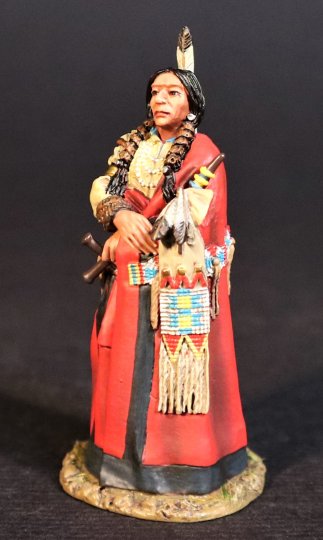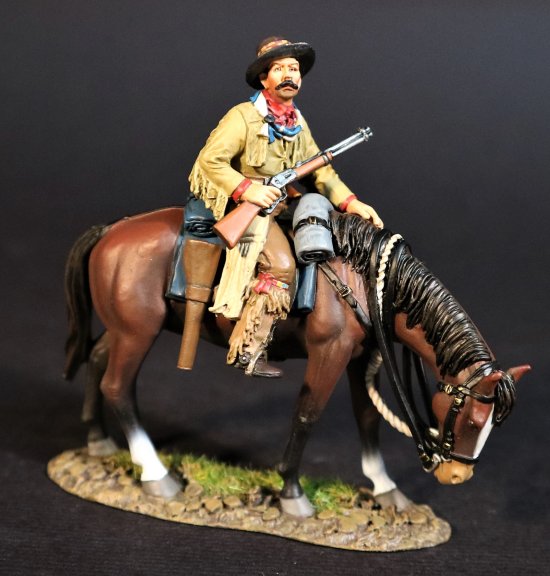- Joined
- Feb 2, 2011
- Messages
- 2,093
NEW RELEASES FOR MAY 2023
THE FUR TRADE
Sitting Bull (c. 1831 – Dec.15[SUP]th[/SUP] 1890) was a Hunkpapa Lakota leader who led his people during years of resistance against United States government policies. He was killed by Indian agency police on the Standing Rock Indian Reservation during an attempt to arrest him, at a time when authorities feared that he would join the Ghost Dance movement.

WSP-90
THE FUR TRADE,
CHIEF SITTING BULL.
(1 pc)
Before the Battle of Little BigHorn, Sitting Bull had a vision in which he saw many soldiers, “as thick as grasshoppers”, falling upside down into the Lakota camp, which his people took as a foreshadowing of a major victory in which many soldiers would be killed.
About three weeks later, the confederated Lakota tribes with the Northern Cheyenne defeated the 7[SUP]th[/SUP] Cavalry under Lt. Col George Armstrong Custer on June 25[SUP]th[/SUP], 1876, annihilating Custer’s battalion and seeming to fulfill Sitting Bull’s prophetic vision. Sitting Bull’s leadership inspired his people to a major victory.
The Native Americans' victory celebrations were short-lived. Public shock and outrage at Custer's defeat and death, as well as the government's understanding of the military capability of the remaining Sioux, led the War Department to assign thousands more soldiers to the area. Over the next year, the new American military forces pursued the Lakota, forcing many of the Native Americans to surrender.
Sitting Bull refused to surrender, and in May 1877, he led his band north to Wood Mountain, North West Territories (now Saskatchewan) Canada.
He remained there until 1881, refusing a pardon and a chance to return.
When crossing the border into Canadian territory, Sitting Bull was met by the North West Mounted Police of the region. During this meeting, James Morrow Walsh, commander of the North West Mounted Police, explained to Sitting Bull that the Lakota were now on British soil and must obey British law.
Walsh emphasized that he enforced the law equally and that every person in the territory had a right to justice. Walsh became an advocate for Sitting Bull and the two became good friends for the remainder of their lives.
Sitting Bull and his people stayed in Canada for four years. Due to the smaller size of the buffalo herds in Canada, Sitting Bull and his men found it difficult to find enough food to feed their starving people. Sitting Bull's presence in the country led to increased tensions between the Canadian and the United States governments.

WSP-61
THE FUR TRADE,
JEREMIAH “JERRY” POTTS.
(2 pcs)
Jeremiah “Jerry” Potts (1840 – July 14, 1896),
Jerry Potts also known as “Bear Child” was a half-blood Indian, half Scottish scout
In 1871, Potts' mother was murdered by a man drunk on "firewater." So, Potts declared his own personal war on the whiskey runners. By the time Potts was 36, he had killed at least 40 men, mostly whiskey runners.
In September 1874, Potts was trading horses in Fort Benton, Montana, when he was hired as a guide, interpreter and scout by the North West Mounted Police.
Potts was already a legend in this part of the world, and became an extremely important part of the NWMP in his diplomatic communications between the police and the various native American tribes.
His contract as a guide was to last twenty two years. He was paid three times a police constables salery.
He ceased working at the age of fifty eight because of the pain from throat cancer, and was to die a year later on 14[SUP]th[/SUP] July 1896 at Fort Macleod.
The Macleod Gazette and Alberta Livestock Record paid tribute to the man who “made it possible for a small and utterly insufficient force to occupy and gradually dominate what might so easily, under other circumstances, have been a hostile and difficult country. . . . Had he been other than he was . . . it is not too much to say that the history of the North West would have been vastly different to what it is.”
Jerry Potts was buried at Fort Macleod with the rank of Special Constable in the North West Mounted Police.
**PLEASE CONTACT YOUR LOCAL DEALER FOR FURTHER INFORMATION**
THE FUR TRADE
Sitting Bull (c. 1831 – Dec.15[SUP]th[/SUP] 1890) was a Hunkpapa Lakota leader who led his people during years of resistance against United States government policies. He was killed by Indian agency police on the Standing Rock Indian Reservation during an attempt to arrest him, at a time when authorities feared that he would join the Ghost Dance movement.

WSP-90
THE FUR TRADE,
CHIEF SITTING BULL.
(1 pc)
Before the Battle of Little BigHorn, Sitting Bull had a vision in which he saw many soldiers, “as thick as grasshoppers”, falling upside down into the Lakota camp, which his people took as a foreshadowing of a major victory in which many soldiers would be killed.
About three weeks later, the confederated Lakota tribes with the Northern Cheyenne defeated the 7[SUP]th[/SUP] Cavalry under Lt. Col George Armstrong Custer on June 25[SUP]th[/SUP], 1876, annihilating Custer’s battalion and seeming to fulfill Sitting Bull’s prophetic vision. Sitting Bull’s leadership inspired his people to a major victory.
The Native Americans' victory celebrations were short-lived. Public shock and outrage at Custer's defeat and death, as well as the government's understanding of the military capability of the remaining Sioux, led the War Department to assign thousands more soldiers to the area. Over the next year, the new American military forces pursued the Lakota, forcing many of the Native Americans to surrender.
Sitting Bull refused to surrender, and in May 1877, he led his band north to Wood Mountain, North West Territories (now Saskatchewan) Canada.
He remained there until 1881, refusing a pardon and a chance to return.
When crossing the border into Canadian territory, Sitting Bull was met by the North West Mounted Police of the region. During this meeting, James Morrow Walsh, commander of the North West Mounted Police, explained to Sitting Bull that the Lakota were now on British soil and must obey British law.
Walsh emphasized that he enforced the law equally and that every person in the territory had a right to justice. Walsh became an advocate for Sitting Bull and the two became good friends for the remainder of their lives.
Sitting Bull and his people stayed in Canada for four years. Due to the smaller size of the buffalo herds in Canada, Sitting Bull and his men found it difficult to find enough food to feed their starving people. Sitting Bull's presence in the country led to increased tensions between the Canadian and the United States governments.

WSP-61
THE FUR TRADE,
JEREMIAH “JERRY” POTTS.
(2 pcs)
Jeremiah “Jerry” Potts (1840 – July 14, 1896),
Jerry Potts also known as “Bear Child” was a half-blood Indian, half Scottish scout
In 1871, Potts' mother was murdered by a man drunk on "firewater." So, Potts declared his own personal war on the whiskey runners. By the time Potts was 36, he had killed at least 40 men, mostly whiskey runners.
In September 1874, Potts was trading horses in Fort Benton, Montana, when he was hired as a guide, interpreter and scout by the North West Mounted Police.
Potts was already a legend in this part of the world, and became an extremely important part of the NWMP in his diplomatic communications between the police and the various native American tribes.
His contract as a guide was to last twenty two years. He was paid three times a police constables salery.
He ceased working at the age of fifty eight because of the pain from throat cancer, and was to die a year later on 14[SUP]th[/SUP] July 1896 at Fort Macleod.
The Macleod Gazette and Alberta Livestock Record paid tribute to the man who “made it possible for a small and utterly insufficient force to occupy and gradually dominate what might so easily, under other circumstances, have been a hostile and difficult country. . . . Had he been other than he was . . . it is not too much to say that the history of the North West would have been vastly different to what it is.”
Jerry Potts was buried at Fort Macleod with the rank of Special Constable in the North West Mounted Police.
**PLEASE CONTACT YOUR LOCAL DEALER FOR FURTHER INFORMATION**

